🧵 View Thread
🧵 Thread (33 tweets)

"In general, boys are taught to value and lead with certain parts of them and to exile others. Girls are socialized to do the same, but with different sets of parts. These differences... challenge the common assumption that women are better equipped to be intimate than men." https://t.co/owgNXj9UJn
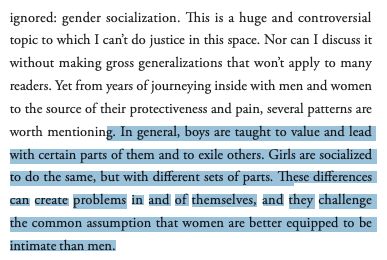

"In that pattern, boys were nurtured by their caretaker (usually their mother) until a certain young age—perhaps four or five—when, out of fear of their being sissified, they were wrenched away and often brutally shamed by their father or by peers..." https://t.co/BM9EWfPj8r
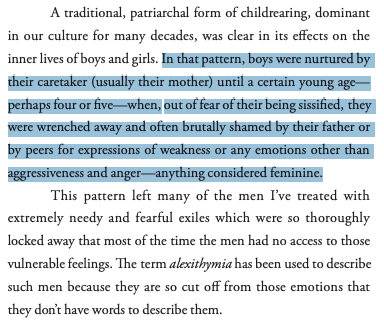

"... for expressions of weakness or any emotions other than aggressiveness and anger—anything considered feminine." "This pattern left many of the men I’ve treated with extremely needy and fearful exiles which were so thoroughly locked away that most of the time..."

"To keep their dark fear and loneliness at bay, men become dominated by rational, aggressive, competitive, never let-’em-see-you-sweat protectors that serve them well in the business world and are determined to never again allow them to be hurt or humiliated." https://t.co/CyONNfw63a


"Instead, traditionally raised girls were supposed to be caretakers.... [T]he focus on caretaking others left them little ability to nurture their own vulnerable parts. Whereas men tried to abandon those exiles, women learned to find comfort for them in relationships." https://t.co/goIBq9GTcF
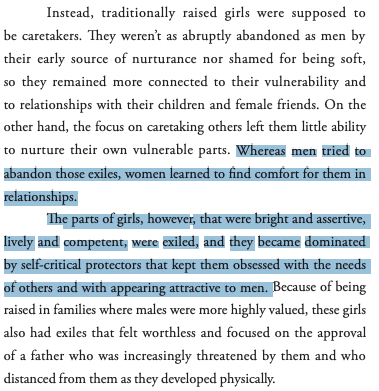

"The parts of girls, however, that were bright and assertive, lively and competent, were exiled, and they became dominated by self-critical protectors that kept them obsessed with the needs of others and with appearing attractive to men."

"Because of being raised in families where males were more highly valued, these girls also had exiles that felt worthless and focused on the approval of a father who was increasingly threatened by them and who distanced from them as they developed physically."

"Since the sixties, the traditional ways of being men and women have been challenged, creating confusing contradictions for both genders. Now men are still expected to be strong and high achieving in the outside world, but within their relationship they should be..." https://t.co/UasGRLh27w
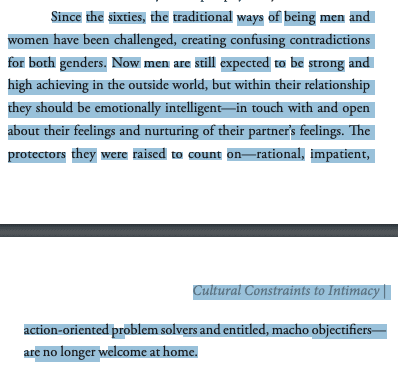

"... emotionally intelligent—in touch with and open about their feelings and nurturing of their partner’s feelings. The protectors they were raised to count on—rational, impatient, action-oriented problem solvers and entitled, macho objectifiers—are no longer welcome at home."

"In this way, men are expected to perform a total reversal of their entrenched inner systems. Suddenly they are supposed to access the very same vulnerable, sensitive, and caring parts that they spent their lives trying to keep locked up." https://t.co/RD82Q5BkKH
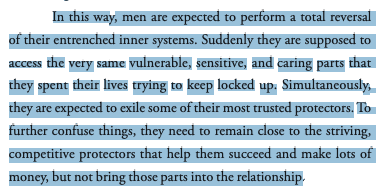

"Simultaneously, they are expected to exile some of their most trusted protectors. To further confuse things, they need to remain close to the striving, competitive protectors that help them succeed and make lots of money, but not bring those parts into the relationship."

"Since in their relationship they can’t rely on aggressiveness or rationality anymore, many men just give up and hide behind stony walls of indifference and passivity, which only further enrages their partners." https://t.co/dYLfVJUlfh
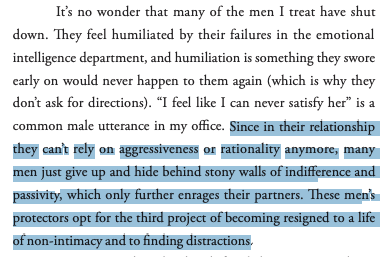

"Women, on the other hand, faced their own quandaries as gender expectations shifted. In the post-sixties world, they were expected to shed their subservient and self-sacrificing selves and find their power—the assertive and ambitious parts they had exiled earlier." https://t.co/B0qsPjf0XX
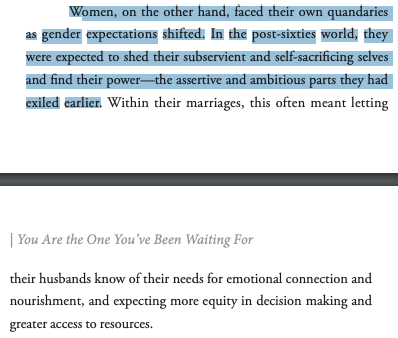

"[W]omen were trying to achieve a reversal of entrenched inner systems without knowing how.... [T]heir caretaker parts... led them to do more than their share at home (in full collusion with their husbands’ entitled parts) while also working outside the home." https://t.co/uDWQZJ7idD
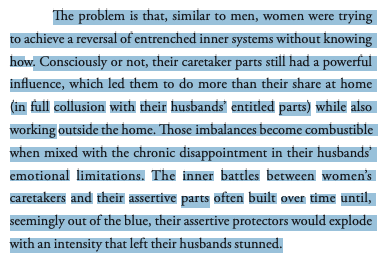

"[W]hen mixed with the chronic disappointment in their husbands’ emotional limitations... [t]he inner battles between women’s caretakers and their assertive parts often built over time until, seemingly out of the blue, their assertive protectors would explode"

"[M]en react much more strongly than women when they begin to get into marital conflict and stay activated much longer. They may seem rational and calm on the outside, but inside they are going crazy in reaction to their wives’ criticisms." https://t.co/KlzA7cfBub
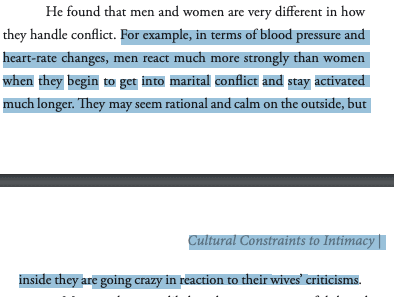

"In addition, he found that as the tension builds in couples’ fights, men are much more likely than women to shut down emotionally and become what he calls stonewallers—people who turn away from and completely ignore their partners in the face of criticism." https://t.co/J4yjnfWX3T
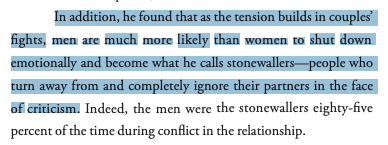

"Women are more likely to bring up issues that lead to arguments and to be critical of their husbands. When he then begins to stonewall, she feels unheard and escalates the argument, leading to a common vicious cycle in which he shuts down more and she gets increasingly angry..." https://t.co/WEeMM1uMK8
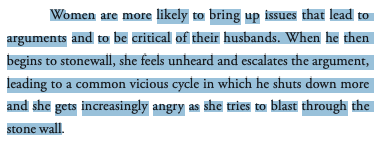

"Given that men have highly vulnerable exiles that they try to keep locked up at all costs, it makes sense that criticism from their wives would trigger the shame those exiles carry, which would account for men’s extreme physiological reactions." https://t.co/JZ7PGOPVy1
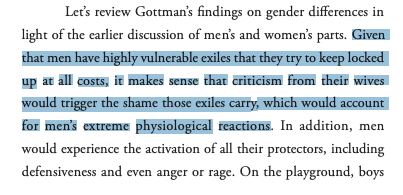

"As we’ve discussed, men’s angry parts aren’t welcome in many marriages and, also, many men fear what they might do to their partner if they let rage take over. So they are left with few alternatives." https://t.co/VMs2bUmEy0


"They are loathe to expose and don’t have words to describe the intense vulnerability they feel, and their customary protectors are taboo. Shutting down externally seems like the safest choice, while... internally their stifled angry protectors continue to roil beneath...."

"Far more than men, women are socialized to take care of their exiles through relationships. Therefore, when their exiles are upset, women want to change things in their marriages so that their distressed exiles get from their husbands the love and comfort those parts need...." https://t.co/TSYbCTm40g
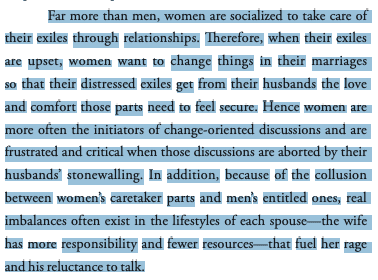

"In addition, because of the collusion between women’s caretaker parts and men’s entitled ones, real imbalances often exist in the lifestyles of each spouse—the wife has more responsibility and fewer resources—that fuel her rage and his reluctance to talk."

"Many men’s exiles are so well insulated from them that it often seems that they don’t need intimacy. The fallacy of that myth is exposed when, for example, their partner decides she has finally had enough and threatens seriously to abandon them." https://t.co/HOcUtNyGyB


"At that point, many men’s protective fortresses crack open, and their raw, needy exiles break through and take over. I’ve seen husbands who a day earlier had seemed aloof, totally in control and independent, transform into desperate, pleading little boys when facing abandonment"

"Many of the incompatibilities between men and women come from differences in how they were trained to relate to those needy parts inside and outside. When it comes to achieving intimacy, both men and women are expected to reverse various rigid internal systems...." https://t.co/itEurzpxuE


"1. ...How much have you exiled the softer, more vulnerable, or “feminine” parts of you? ... Are you the one who doesn’t bring up issues and shuts down when they are brought up? What is conflict like for you? How much do you expect your partner to be nurturing and soft?" https://t.co/xtalB2M3d4
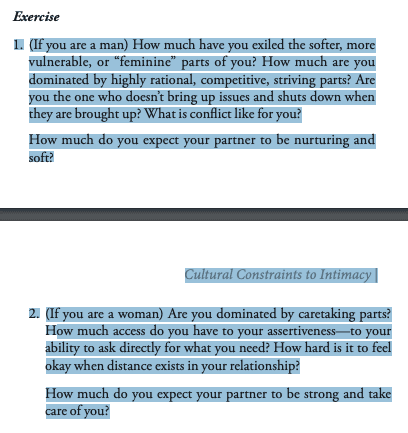

"2. ... Are you dominated by caretaking parts? How much access do you have to your assertiveness—to your ability to ask directly for what you need? How hard is it to feel okay when distance exists in your relationship? How much do you expect your partner to be strong...?"

new thread for part 4, probably will be the last one: https://t.co/2U9btaGuvp
